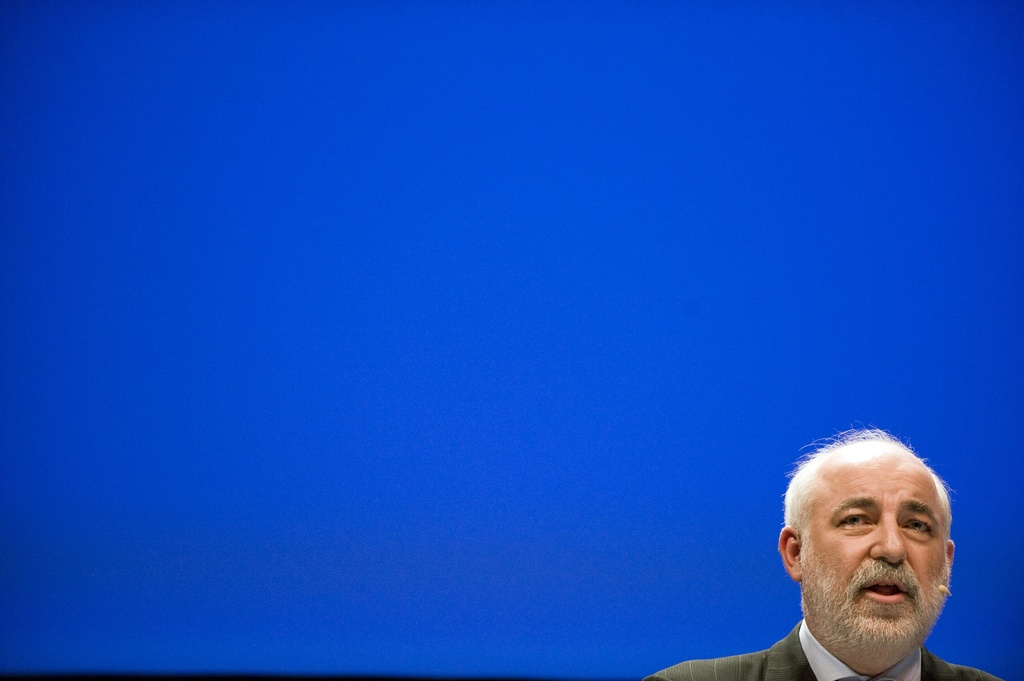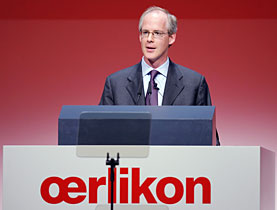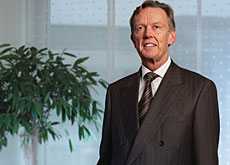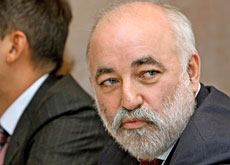Vekselberg takes on ministry after huge fine

Russian tycoon Viktor Vekselberg is set to challenge the Swiss finance ministry’s authority by contesting a massive fine for alleged breaches of stock market rules.
Vekselberg and two co-accused will fight the combined SFr120 million ($120 million) penalty at a court hearing starting on Wednesday. The verdict could have significant repercussions for the future regulation of share transactions.
Experts say the result of the proceedings will test the credibility of the finance ministry as the guardian of fair stock market trading. An intriguing sub-plot revolves around the treatment – fair or otherwise – of three foreigners who ruffled feathers by swallowing up large chunks of Swiss industry.
“For the last ten years we have had stock market rules that were essentially not enforced,” Peter V Kunz, a corporate law expert from Bern University, told swissinfo.ch. “This is the first major prosecution, and if it fails it would send a message to potential violators that nothing will also be done in the future.”
In December of last year, the Swiss finance ministry handed down record fines of SFr40 million each for Vekselberg and two other alleged accomplices – Ronny Pecik and Georg Stumpf.
The three businessmen were found guilty by the ministry of secretly – and illegally – conspiring to take over the Swiss industrial company Oerlikon by breaching market disclosure rules.
Reputational damage
The ministry ruled that Vekselberg’s equity firm Renova acted in concert with the enterprise run by Austrians Pecik and Stumpf – Victory Holding – to buy up Oerlikon shares. The alleged secret collusion was rumbled when Renova bought large chunks of Oerlikon shares from Victory in 2006.
Swiss stock market rules demand that large scale acquisitions of shares are made public and that the new owners identify themselves clearly. Such transparency is designed to keep other shareholders informed about possible changes that might affect their positions and to allow firms time to defend themselves against hostile takeover bids.
While Stumpf and Pecik have kept quiet,Vekselberg has denied any wrongdoing. The ruling could have an enormous impact on his future standing in Switzerland, says Kunz.
“Vekselberg has tried very hard to portray himself as a good businessman in Swirtzerland,” he said. “If the court upholds such a hefty fine it would create serious reputational damage for him.”
The two-day court hearing in Bellinzona must not only decide if Renova and Victory acted in partnership, but also how the law exactly defines such collusion, according to Kunz.
“What constitutes a group or not is not at all clear in every detail,” he told swissinfo.ch. “This has been a black hole in Swiss jurisprudence for many years.”
Foreigners welcome?
The unusual severity of the fines imposed by the finance ministry has provoked much comment. The previous record penalty of a mere SFr50,000 had even led the Swiss stock exchange to openly criticise the finance ministry for failing to act more decisively in the past.
But some elements of the Swiss media clearly thought that SFr120 million was taking it too far in the other direction. The right wing Weltwoche news magazine called the fine “far-fetched” and the more liberal Le Temps newspaper a “slap in the face”.
Both journals wondered aloud whether the finance ministry had over-reacted to criticism it was facing in the midst of the financial crisis.
Another talking point has centred on the identity and nationality of the three accused parties. The huge fines have been interpreted in some quarters as a signal to foreigners to keep their hands off Swiss companies.
When news of the fines became public, it provoked a rebuke from Russian Finance Minister Alexei Kudrin that it could damage relations with Switzerland.
The activities of Vekselberg, Stumpf and Pecik certainly caused a stir as they bought large stakes in Swiss household industrial names, such as Oerlikon, Sulzer and Saurer. Their manoeuvres prompted a change in stock market regulations that closed loopholes that had allowed Renova and Victory to buy up shares by stealth.
Transactions in Sulzer also provoked an investigation by the regulator, the Swiss Financial Market Supervisory Authority (Finma). The results of this probe were taken on by the finance ministry that opened separate legal proceedings in April of last year.
Vekselberg would not comment directly to swissinfo.ch about the Bellinzona court case except to communicate through his media spokesman: “If I have to pay this fine, then I will pay.”
Viktor Vekselberg was rated as Russia’s fifth-wealthiest individual, with an estimated personal fortune of SFr8.1 billion ($6.52 billion) before the financial crisis struck.
Married with two children, he lives in Switzerland, having bought a luxury apartment in Zurich. He is an avid collector of Fabergé eggs.
He is chairman of the Renova Group, which has had a long association with Zug-based commodities firm Glencore but started acquiring stakes in Swiss manufacturing companies in 2006.
At first, Renova and the Austrian group, Victory Holding, acted independently as they bought into Swiss companies. But they teamed up briefly to form a third enterprise, Everest, before the venture fell apart acrimoniously.
One of the points the Bellinzona court must decide is exactly when that alliance was officially announced and if any cooperative activity can be proved before this date.
Victory has now largely withdrawn from the Swiss market, leaving Renova with majority stakes in Sulzer and Oerlikon – that own Saurer.
Vekselberg has repeatedly denied reports that he wants to merge the three Swiss companies into a single industrial powerhouse.
The Russian has also denied he is in Switzerland for a quick buck and says he will help open up his lucrative homeland market for his Swiss firms.
Earlier this month it was reported that Vekselberg had lent his weight to a project that would commission Zurich’s Technopark to help Russia set up its own “Silicon Valley”.
(with input from Nicole del Pietra)

In compliance with the JTI standards
More: SWI swissinfo.ch certified by the Journalism Trust Initiative




You can find an overview of ongoing debates with our journalists here. Please join us!
If you want to start a conversation about a topic raised in this article or want to report factual errors, email us at english@swissinfo.ch.